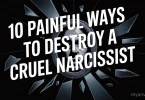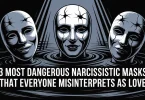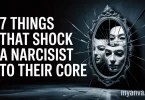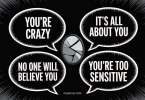Navigating Authenticity in Narcissistic Relationships. So, let’s talk about a conundrum in narcissistic relationships: fawning versus being inauthentic. What are we supposed to do? Something I hear from a lot of people is that they say, “I want to be authentic in all of my relationships.” I repeatedly hear survivors say this, and it’s a great thing, right?
It means that folks are recognizing this is important. They’re healing, hopefully. They’re slowly unearthing that true self and integrating, wanting to live in that true self, to show up as their true, integrated self again.
The Challenge of Authenticity in Unhealthy Relationships
But this tends to hit a stumbling block when the person healing, who is working towards authenticity, runs into or is in an unhealthy or toxic relationship. Being authentic is not necessarily a fast track to a healthier relationship with another person.
It’s important for you, yourself, and in the healthiest of relationships, it will make a difference. But, believe it or not, not in most. Being authentic is not a strategy for fixing a relationship with another person. It is permitting yourself to be you, to have your beliefs, your reality, your “you,” while being in a relationship with another person.
Authenticity in Healthy vs. Unhealthy Dynamics
Now, this can work fabulously when there are two healthy people in a relationship. But, as I said, even that is tricky. Because where I get pushback on this conversation is people saying, “Well, I was being authentic when I told someone that I didn’t like what they were saying, and then that person pulled back, and then I pulled back, and basically, my being authentic resulted in the relationship falling apart.”
Clarifying Authenticity
So, let’s be clear: authenticity doesn’t mean you say what you want, when you want, and there are no consequences or even reactions from the other person or people you’re talking to. Authenticity doesn’t mean that you don’t sometimes inhibit what you say because you are aware of how it may be received, or there is a chance it may not be received well, or could even be hurtful. Authenticity doesn’t mean that you do what feels right to you and then just expect everything to be fine.
The Misuse of Authenticity
Many narcissistic people will use the authenticity framework and say, “Hey, too bad if you’re offended; this is just my truth. You want me to be honest and authentic, right? Well, this is me.” Doesn’t feel very good, right?
Balancing Authenticity with Empathy
So, the magic comes at the crossroads of authenticity, empathy, and self-awareness. It means that as part of your authenticity, you may be aware that a situation is not sitting well with you or is not in line with your values. Or even that someone is doing something you don’t love or stands for something that not only do you not stand for, but you might even be somewhat offended by.
But simultaneously to that, you may like or love this person, see them as an important person in your life, and be aware that life, love, and relationships are a series of really uncomfortable choices at times.
Navigating Uncomfortable Choices
You may say, “My authentic self can’t just be quiet now, okay?” But you saying something may result in the other person feeling hurt or offended, and possibly engaging with you differently. You may not say something, and you may not like that you don’t say something, but you may have a slight shift in how you engage with this person going forward. You may have to revise your schema of them.
That’s being in a relationship. We revise and revise these schemas. Or you may not necessarily turn to them for guidance or opinions on certain situations, or to get guidance on situations, or you may simply realize that you have very different views of certain situations. But you may still care about the person, and over time, this will feel okay, or it won’t feel okay. It depends on the situation, depends on you, depends on the person.
The Reality of Authenticity
But being authentic and saying what we want doesn’t mean that everyone is just going to have an authenticity parade for us. It doesn’t work that way. So then people will say, “Well, this sucks.
How the hell am I supposed to retain or live in my authenticity but still have to continue to engage with some narcissistic or toxic, or even just generally unhealthy, relationships in my life?”
The Inescapability of Unhealthy Relationships
Folks, unless you live in a very special, rarified space, none of us can get rid of all the unhealthy relationships in our lives. And some people will say, “Well, it sounds like my options are to have to continue to fawn and people-please or be authentic.” It’s not an either-or, and that may be oversimplifying things. Life, relationships, people, it’s just not black and white. And the middle paths, the gray, that’s where authenticity happens.
Finding the Middle Ground
There is something in between people-pleasing and being inauthentic, and just saying what you want, and everyone getting in line with what you’re calling your authenticity. There is sometimes the hope that as you excavate your true self and live in it and honor it, that’s going to be some sort of cure-all. It’s not. In some ways, it makes things healthier and more transcendent, but strangely enough, in some ways, it can make things more difficult.
The Work of Discernment and Flexibility
All the stuff in the middle is the discerning and the flexibility, the ability to integrate new information about a person or a relationship and not just run away, but trust ourselves and know who we are even when there are differences between us and the other person, or we don’t even like what they’re doing. And what also happens is that, sure, we may be able to see our most toxic relationships, given time, but we have lots and lots of relationships that sort of live in the middle.
Accepting Differences in Relationships
Nobody is reading this topic who has 100% completely aligned opinions and beliefs with any one person you know, even the person you love most in the world, even the person you trust most in the world. You have differences with them. In the luckiest cases, you just love each other through it and even call each other out.
But in most cases, we might cut wide berths around certain stuff with certain people. I have seen people have to do that in relationships around politics, value systems, and around third-rail issues like infidelity, religion, child-rearing, around money, around lifestyle issues.
It’s an unspoken but recognized truth in the relationship, a love that can persist despite an “agree to disagree.” And maybe you even once did have a fight with the person in your life, but came together and said, “I’m never going to agree with you on this, but I love you, and I’m not going to die on this hill.”
When Differences End Relationships
Some friendships can’t do this. Some issues bring up something too painful, and you may encounter someone who says, “I am going to die on this hill. I can’t be friends with someone who believes what you do.” And that can be a tough day, especially if it happens to you. It can feel like, “Oh, here we go again.
I showed up as my true self, and now this person leaves.” Frankly, better that they leave than that they try to shape you, or you shape yourself, into who you have to be for them to love you. And that’s what happens in narcissistic relationships.
The Value of Honest Disagreement
But I have to say, I would rather someone had the courage to say to me, I don’t agree with you, and frankly, now that you told me this or you behaved like this, I don’t know if it will ever feel as close as it was.” I would rather have that than someone who gaslights me and pretends that everything is fine when they’re disconnecting, when they have changed their behavior, when they do detach and tell me, “Oh no, nothing’s changed.” That is not authentic.
Setting Boundaries with Honesty
Maybe just saying, “I don’t agree with you,” or “You don’t agree with me,” or “I really don’t want to talk about this with you, and I love you, so can we not go there?” At least that’s honest. And it’s not inauthentic to be unwilling to go to that topic again.
Personal Reflections on Ideological Differences
In my case, I have to say that’s sort of where this topic came from, since some things that happened in my life, some people I love most in the world, I’ve had some significant ideological gulfs with. We’ve had different lives; we believe different things. And yes, it did get heated in some cases. And in other cases, I had to make a mental note, like, “Do not go there with them.” You kind of have this big filing cabinet in your head; it’s just too uncomfortable.
The Role of Social Groups
This is why we need social groups. There are folks in my life who do share those beliefs that other friends don’t, and I can chat with them. But maybe with this other group of people, we aren’t as well-matched on other stuff. We can’t spend our lives looking for a perfect mirror; that’s infantile. No one’s ever going to be completely aligned with us.
The Yearning for a Perfect Mirror
Now, maybe for many of us, the unresolved wound is that one person who is all ours, gets us completely, almost reads our minds. My point is that that’s the infantile relationship a new baby has with its caregiver. And if the baby’s lucky, and that all gets navigated well in infancy, the baby then has an attuned, secure, safe, protected caregiver.
Then the child never needs that all-encompassing, almost perfectly mirrored attachment figure again. But as we heal from narcissistic relationships, there is often a yearning that remains, especially if our original narcissistic relationship was a parent, a yearning for that one person we can just be completely ourselves with, and that person’s a perfect mirror. That, however, is not adulthood, and that is not how adult relationships work.
Redefining Authenticity
Authenticity is not just being brazen and being disinhibited and expecting there’ll be no consequences because you’re being authentic and cutting out everyone we don’t agree with. That’s not authenticity. It’s knowing ourselves, it’s knowing our relationships, it’s knowing our limitations, and it’s knowing theirs. It’s being self-aware and also being aware of how our words and actions affect others. And it’s about not giving up on ourselves, not becoming something else to be loved.
Holding Onto Your Authentic Self
Authenticity is about holding on to what we cherish in ourselves and navigating relationships that we value accordingly. And none of this is easy, and we do and will mess it up in some way every single day, trust me.
The Weaponization of Authenticity
Narcissistic people love to jump on the authenticity train and will often weaponize it. And sometimes people who aren’t narcissistic but aren’t healthy perhaps people who lean into passive-aggression or use withholding or withdrawing in a punitive manner may abruptly speak their truth and then get angry when people hold them accountable, or they will deny their pulling back when they feel that their authenticity is not being embraced.
Steps to Authentic Living
So, you want to break it down?
- Step One: Know Yourself
Understand who you are and what you value. - Step Two: Recognize Resistance
Not everyone will be down with you knowing yourself. - Step Three: Accept It
That’s okay; you still have to know yourself. - Step Four: Be Discerning
Choose wisely when and how to express your authenticity. - Step Five: Keep Checking In
Regularly reflect on your authenticity and relationships. - Step Six: Embrace Imperfection
Remember, no one will be a perfect mirror, but if we do have some healthy people around us, sometimes the concessions we make that don’t involve us giving up on ourselves to be what someone else wants, but rather us being discerning and a little flexible, are worth it.
The Nuanced Nature of Authenticity
It’s nuanced stuff, folks. But the reason most people are not authentic is because, while it might make sense within us to be authentic, it’s not always what the world wants. And it’s really hard to always feel like we’re fighting against the world to be our true selves.
Balancing Authenticity and Relationships
That balance is to be able to hold on to that authentic self but also be flexible enough to realize the importance of the healthy relationships in our lives and be mindful and deeply honest with ourselves about the kinds of concessions and modifications we’re willing to make in our relationships. Nothing is black or white. Health happens in the gray.






